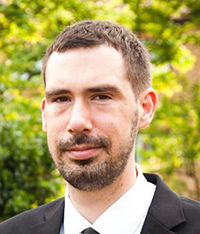Keynote
NLP4RE will feature a keynote from Tristan Miller from The Austrian Research Institute for Artificial Intelligence discussing the recent research advances on natural language ambiguity from an NLP perspective to inspire the RE community with new future directions.
Don't shun the pun: On the requirements and constraints for preserving ambiguity in the (machine) translation of humour
How do we know when a translation is good? This seemingly simple question has long dogged human practitioners of translation, and has arguably taken on even greater importance in today's world of fully automatic, end-to-end machine translation systems. Much of the difficulty in assessing translation quality is that different translations of the same text may be made for different purposes, each of which entails a unique set of requirements and constraints. This difficulty is compounded by ambiguities in the source text, which must be identified and then preserved or eliminated according to the needs of the translation and the (apparent) intent of the source text. In this talk, I survey the state of the art in linguistics, computational linguistics, translation, and machine translation as it relates to the notion of linguistic ambiguity in general, and intentional humorous ambiguity in particular. I describe the various constraints and requirements of different types of translations and provide examples of how various automatic and interactive techniques from natural language processing can be used to detect and then resolve or preserve linguistic ambiguities according to these constraints and requirements. In the vein of the "Translator's Amanuensis" proposed by Martin Kay, I outline some specific proposals concerning how the hitherto disparate work in the aforementioned fields can be connected with a view to producing "machine-in-the-loop" computer-assisted translation (CAT) tools to assist human translators in selecting and implementing pun translation strategies in furtherance of the translation requirements. Throughout the talk, I will attempt to draw links with how this research relates to the requirements engineering community.

Biography. Tristan Miller is is a computational linguist working mainly in the area of lexical semantics. His research interests include word sense disambiguation, lexical substitution, and computational detection, and interpretation of humour. Since 2019 Tristan has been working as a research scientist in the Language and Interaction Technologies Group of the Austrian Research Institute for Artificial intelligence (OFAI), where he heads the project Computational Pun-derstanding: Computer-Assisted Translation of Humorous Wordplay.
Accepted Papers
- Monica Arrabito, Alessandro Fantechi, Stefania Gnesi and Laura Semini. A comparison of NLP Tools for RE to extract Variation Points
- Kenji Mori, Naoko Okubo, Yasushi Ueda, Masafumi Katahira and Toshiyuki Amagasa. Toward Latent Knowledge Extraction Based on the Correlation of Heterogeneous Text Data Related to Space System Development
- Olivia Kenney and Matt Cooper. QVscribe for Practical and Effective NLP4RE
- Long Wang, Hiroyuki Nakagawa and Tatsuhiro Tsuchiya. Opinion Analysis and Organization of Mobile Application User Reviews
- Manlio Bacco, Gianluca Brunori, Felice Dell'Orletta and Alessio Ferrari. Using NLP to Support Terminology Extraction and Domain Scoping: Report on the H2020 DESIRA Project
- Bert de Brock. On System Sequence Descriptions
- Vaibhav Jain, Ruchika Malhotra, Sanskar Jain and Nishant Tanwar. Cross-Domain Ambiguity Detection using Linear Transformation of Word Embedding Spaces
Program
| TIME (UTC+2) | TITLE |
|---|---|
| 12:45 - 12:50 | Welcome and Intro |
| SESSION 1 | |
| 12:50 - 13.05 | Toward Latent Knowledge Extraction Based on the Correlation of Heterogeneous Text Data Related to Space System Development |
| 13.05 - 13.20 | Opinion Analysis and Organization of Mobile Application User Reviews |
| 13.20 - 13.35 | Cross-Domain Ambiguity Detection using Linear Transformation of Word Embedding Spaces |
| 13.35 - 13.45 | Using NLP to Support Terminology Extraction and Domain Scoping: Report on the H2020 DESIRA Project |
| 13.45 - 14.00 | Fun activity 😀 |
| 14:00 - 14:15 | BREAK |
| SESSION 2 | |
| 14:15 - 14:30 | A comparison of NLP Tools for RE to extract Variation Points |
| 14:30 - 14:40 | QVscribe for Practical and Effective NLP4RE |
| 14:40 - 14:55 | On System Sequence Descriptions |
| 14:55 - 15:15 | Fun activity 😀 |
| 15:15 - 15:30 | BREAK |
| SESSION 3 | |
| 15:30 - 16:15 | Keynote by Tristan Miller |
| 16:15 - 16:30 | Fun activity 😀 |
| 16:30 - 16:45 | Discussion and wrap up |
Authors notification: February 7th
Camera Ready: February 28th
Workshop: June 23rd
Davide Fucci Blekinge Institute of Technlogy (Sweden)
Fabiano Dalpiaz Utrecht University (The Netherlands)
Xavier Franch Universitat Politècnica de Barcelona (Spain)